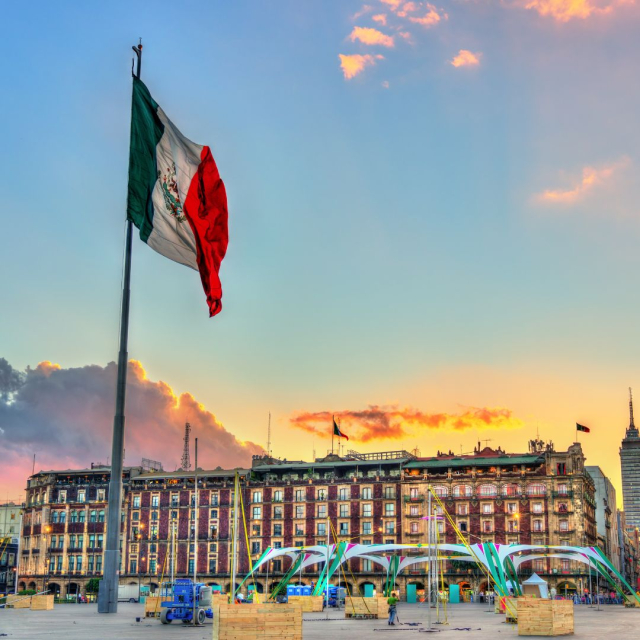Mexico's Constitution Day, celebrated on February 5 of each year, is one of the most significant dates in the country's civic calendar. This day commemorates the promulgation of the Political Constitution of the United Mexican States of 1917, a document that marked a milestone in the history of Mexico by establishing the fundamental principles of justice, democracy and human rights.
The origins of the 1917 Constitution
The 1917 Constitution was born in a context of social and political unrest during the Mexican Revolution, an armed conflict that began in 1910 and sought to end the social and economic injustices prevalent during the regime of Porfirio Díaz. Demands for agrarian reform, labor rights, and democracy became the main driving force of this struggle, led by figures such as Emiliano Zapata, Francisco Villa, and Francisco I. Madero.
The Constituent Congress, convened by Venustiano Carranza in 1916, met in Querétaro to draft a new legal framework that would respond to the social demands of the Revolution. The Constitution was promulgated on February 5, 1917, and its content reflected a commitment to revolutionary aspirations by including progressive principles regarding social rights, such as free, secular and compulsory education, agrarian reform and the protection of labor rights.
The fundamental principles of the Constitution
The 1917 Constitution was innovative for its time and served as a model for other nations. Some of its most notable principles are:
Article 3: Education
This article established that education provided by the State must be free, secular and compulsory, a crucial step in combating illiteracy and promoting equal opportunities.Article 27: Agrarian Reform
It recognized the nation's right to its natural resources and laid the groundwork for land redistribution, a central demand during the Revolution.Article 123: Labor Rights
It established eight-hour work days, the right to a fair wage, social security, and the protection of workers' rights, including the right to strike.National Sovereignty and Separation of Powers
The Constitution reinforced the republican, democratic and federal system of government, with a clear separation of powers between the executive, legislative and judicial branches.
The evolution of Constitution Day
Initially, Constitution Day was celebrated as a solemn date to remember the nation's core values. Over time, the Mexican government decided to institutionalize this celebration to promote national pride and civic education. In 2006, as part of a reform to encourage long weekends, the Mexican Congress decreed that Constitution Day would be celebrated on the first Monday in February, allowing families to enjoy a period of rest and reflection.
Forms of celebration
Constitution Day is a civic date in Mexico that does not involve religious festivities, but rather commemorative activities organized by government, educational and social institutions.
Official ceremonies
In various cities across the country, especially in Querétaro, solemn ceremonies and parades are held. Local, military and school authorities participate in these activities, paying tribute to the authors of the document and reflecting on its importance.Educational events
Schools often organize civic events, exhibitions and cultural activities to help students understand the historical context and relevance of the Constitution.Museums and exhibitions
Places like the Teatro de la República in Querétaro, where the Constitution was promulgated, offer guided tours and special events on this date.Family days off
Thanks to the celebration being moved to the first Monday in February, many families take advantage of the long weekend to travel or participate in recreational activities.
The impact of the Constitution on Mexican society
The 1917 Constitution remains a fundamental pillar of Mexico's political, social and economic life. Although it has been modified on numerous occasions to adapt to social and technological changes, its essential principles remain in force.
Social and labor rights
The Constitution continues to guarantee basic rights such as education, health and social security, although challenges to its implementation have been constant.Democracy and citizen participation
The document establishes the framework for free and transparent elections, strengthening citizen participation in the democratic life of the country.Constitutional reforms
Over the years, the Constitution has been subject to more than 700 amendments. These modifications reflect attempts to adapt the legal framework to contemporary challenges, including issues such as gender equality, the rights of indigenous communities and environmental protection.
Contemporary challenges
Despite its historical importance, the Constitution faces criticism and challenges today. Among the main challenges are:
The gap between text and reality
Although the Constitution enshrines progressive rights, their effective implementation remains limited in some regions of the country due to structural problems such as corruption, inequality and insecurity.Access to justice
Many citizens face difficulties in accessing an efficient and transparent judicial system, which limits the full exercise of their rights.Adapting to new challenges
Globalization, climate change and the technological revolution pose new demands that require a constant updating of the legal framework.
The legacy of the 1917 Constitution
Constitution Day celebrates not only a legal document, but also the values and aspirations of justice, equality and democracy that inspire Mexico as a nation. It is a reminder that building a more equitable society requires both the commitment of the government and the active participation of citizens.
As Mexico moves forward in the 21st century, the spirit of the Constitution remains a guide to meeting challenges and building a more inclusive and prosperous future. With each commemoration of February 5, Mexicans have the opportunity to reflect on their history and renew their commitment to the ideals that shaped modern Mexico.
